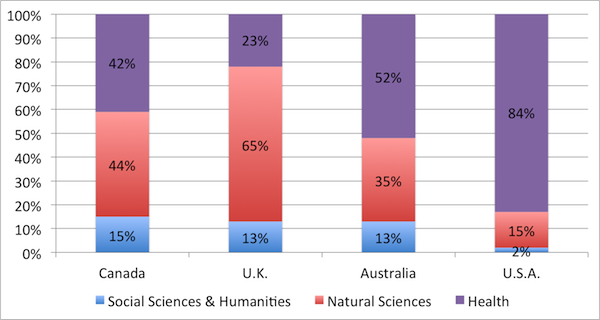After writing about SSHRC a couple of weeks ago one very loyal reader requested that I elaborate on the point that the social sciences and humanities are treated well in Canada compared to other countries. I’m a sucker for loyal readers, so:
I’ll say straight off that that comparing national granting council budgets is tricky because there are some significant structural differences in the way research gets funded in different countries (i.e., not all funding goes through granting councils). When reading what’s below, remember I am likely missing some important mitigating factors that might affect the comparison. If you spot any, let me know – I’ll be happy to print corrections to any biases I may have here.
With that caveat, let’s check out how the rest of the English-speaking world funds granting councils.
Canada’s total granting council budget is split 43.7%-41.6%-14.6% between NSERC, CIHR and SSHRC. In the U.K., there are 6 councils which grant directly to researchers – one for Medicine, one for Arts & Humanities, another for Economic and Social Research, and three in the sciences (Biotech/Biology, Engineering and Physics, and Natural Environment). Mapping this to Canadian categories, the split is 64.7% to NSERC equivalents, 22.6% to Medicine and 12.7% to SSHRC equivalents. In Australia, the National Health and Medical Research Council (NHMRC) takes about 52% of the overall research budget, and the Australian Research Council (ARC) gets the rest. Parsing out 2009 ARC grants by disciplines gets you a figure of 13.2% of the total budget going to SSHRC subjects and 34.5% going to NSERC subjects.
The United States is the real outlier here. There is a National Endowment for the Humanities (NEH), but very little of its money goes to scholarship – it’s closer to the Canada Council than it is to SSHRC. The National Science Foundation’s budget is not easy to analyse, but excluding hard-to-classify stuff like Arctic research and “general education programs,” I find $4.3 billion going to researchers in NSERC disciplines and $247 million going to researchers in SSHRC disciplines. The National Institutes of Health (NIH) gives out a whopping $25 billion in competitive grants – which is more than three times the NSF and NEH combined.
So, Canada comes out tops on social sciences and humanities funding, though not by a huge margin. Where researchers here might have a complaint is that so much SSHRC funding is dedicated to graduate scholarships – pull those out and look only at funding for research projects and Canada’s total might not look quite as good for those in the social sciences and humanities.
The real question, of course, is “does this extra financing give us better research in the social sciences and humanities”? But I’ll leave that one to the Council of Canadian Academies.


 Tweet this post
Tweet this post
